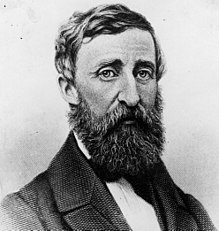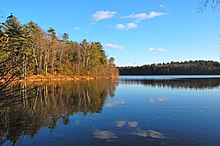Walden
The work is part personal declaration of independence, social experiment, voyage of spiritual discovery, satire, and—to some degree—a manual for self-reliance.
He identifies many plants and animals by both their popular and scientific names, records in detail the color and clarity of different bodies of water, precisely dates and describes the freezing and thawing of the pond, and recounts his experiments to measure the depth and shape of the bottom of the supposedly "bottomless" Walden Pond.
White stated on this note, "Henry went forth to battle when he took to the woods, and Walden is the report of a man torn by two powerful and opposing drives—the desire to enjoy the world and the urge to set the world straight", while Leo Marx noted that Thoreau's stay at Walden Pond was an experiment based on his teacher Emerson's "method and of nature" and that it was a "report of an experiment in transcendental pastoralism".
Others have assumed Thoreau's intention during his time at Walden Pond was "to conduct an experiment: Could he survive, possibly even thrive, by stripping away all superfluous luxuries, living a plain, simple life in radically reduced conditions?"
Although Thoreau went to Walden to escape what he considered "over-civilization", and in search of the "raw" and "savage delight" of the wilderness, he also spent considerable amounts of his time reading and writing.
[3] Thoreau used his time at Walden Pond (July 4, 1845 – September 6, 1847) to write his first book, A Week on the Concord and Merrimack Rivers (1849).
The experience later inspired Walden, in which Thoreau compresses the time into a single calendar year and uses passages of four seasons to symbolize human development.
The latter provided Thoreau with a work exchange: he could build a small house and plant a garden if he cleared some land on the woodlot and did other chores while there.
[5] Thoreau meticulously records his expenditures and earnings, demonstrating his understanding of "economy", as he builds his house and buys and grows food.
He announces that he resides far from social relationships that mail represents (post office) and the majority of the chapter focuses on his thoughts while constructing and living in his new home at Walden.
[6] Likewise, he obtains pleasure in the sounds that fill his cabin: church bells ringing, carriages rattling and rumbling, cows lowing, whip-poor-wills singing, owls hooting, frogs croaking, and cockerels crowing.
[8] Thoreau repeatedly reflects on the benefits of nature and of his deep communion with it and states that the only "medicine he needs is a draught of morning air".
He receives visits from those living or working nearby and gives special attention to a French Canadian born woodsman named Alec Thérien.
The Village: The chapter focuses on Thoreau's reflections on the journeys he takes several times a week to Concord, where he gathers the latest gossip and meets with townsmen.
On one of his journeys into Concord, Thoreau is detained and jailed for his refusal to pay a poll tax to the "state that buys and sells men, women, and children, like cattle at the door of its senate-house".
Baker Farm: While on an afternoon ramble in the woods, Thoreau gets caught in a rainstorm and takes shelter in the dirty, dismal hut of John Field, a penniless but hard-working Irish farmhand, and his wife and children.
Thoreau urges Field to live a simple yet independent and fulfilling life in the woods, thereby freeing himself of employers and creditors.
He concludes that the primitive, carnal sensuality of humans drives them to kill and eat animals, and that a person who transcends this propensity is superior to those who cannot.
House-Warming: After picking November berries in the woods, Thoreau adds a chimney, and finally plasters the walls of his sturdy house to stave off the cold of the oncoming winter.
He relates his observations of owls, hares, red squirrels, mice, and various birds as they hunt, sing, and eat the scraps and corn he put out for them.
[10]Walden is a difficult book to read for three reasons: First, it was written in an older prose, which uses surgically precise language, extended, allegorical metaphors, long and complex paragraphs and sentences, and vivid, detailed, and insightful descriptions.
Thoreau does not hesitate to use metaphors, allusions, understatement, hyperbole, personification, irony, satire, metonymy, synecdoche, and oxymorons, and he can shift from a scientific to a transcendental point of view in mid-sentence.
Thoreau must use non-literal language to express these notions, and the reader must reach out to understand.Walden emphasizes the importance of solitude, contemplation, and closeness to nature in transcending the "desperate" existence that, he argues, is the lot of most people.
[18][dubious – discuss] According to scholar Judith Saunders, the signature biblical allusion identified in the book is, "Walden was dead and is alive again.
[21] It is often assumed that critics initially ignored Walden, and that those who reviewed the book were evenly split or slightly more negative than positive in their assessment of it.
[22] Some reviews were rather superficial, merely recommending the book or predicting its success with the public; others were more lengthy, detailed, and nuanced with both positive and negative comments.
Less than three weeks after the book's publication, Thoreau's mentor, Ralph Waldo Emerson, proclaimed, "All American kind are delighted with Walden as far as they have dared to say.
[28] Poet John Greenleaf Whittier criticized what he perceived as the message in Walden that man should lower himself to the level of a woodchuck and walk on four legs.
[33] Kathryn Schulz has accused Thoreau of hypocrisy, misanthropy and being sanctimonious based on his writings in Walden,[34] although this criticism has been perceived as highly selective.
[38] The game production was also supported by grants from the National Endowment for the Humanities and was part of the Sundance New Frontier Story Lab in 2014.






